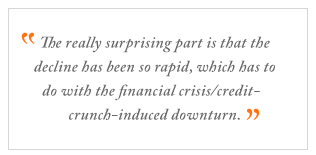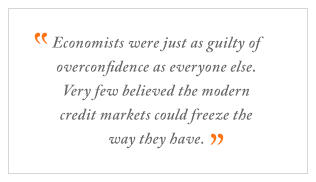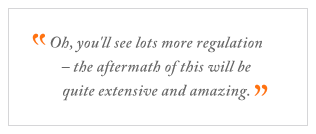The first day on the job is always difficult. You must learn new names and new faces, find where they keep the office supplies, then figure out how to do what you were hired for. But imagine doing all that while your organization's financial system is in a nosedive -- its debt increasing by $3.87 billion a day -- and not long ago, many of your highest ranking coworkers actively campaigned to keep you from getting the job.

And that's just the beginning of the situation President-Elect Barack Obama is facing. The list of challenges seems endless: two wars, the ever-present threat of terrorism, and a global economic meltdown, along with myriad other troubles both at home and abroad. By all reports, he's keenly aware that he must hit the ground running on January 20 and has been rapidly assembling his executive team. But, says Gallup Chief Economist Dennis Jacobe, Ph.D., -- and many other economists too -- President Obama's first priority when taking office should be shoring up the U.S. economy.
In the following interview, Dr. Jacobe outlines what he thinks are the incoming president's most pressing economic concerns and how to solve them. He explains why policymakers keep shooting themselves -- and by extension, the taxpayers -- in the foot and how Obama can avoid doing the same. And he discusses what Obama and business leaders should expect in 2009, some of which is actually good news, though the vast majority of it isn't.
GMJ: So what is President-Elect Obama walking into? How bad will the economic situation be in January?
Dr. Jacobe: It depends on whether this recession will be deep and relatively short or if it will be deep and relatively long. Nobody debates that while the recession started a year ago, the already-slowing economy fell off a cliff in mid-September 2008 and has just gone straight down at an amazingly fast pace.
The really surprising part is that the decline has been so rapid, which has to do with the financial crisis/credit-crunch-induced downturn. That's unlike most of the other recessions we've experienced over the past forty or fifty years, which have been driven by unemployment. Now we are seeing jobs disappear at an alarming rate, and that should continue for a while. Current economic trends suggest we will have a recession that is as bad as that of 1981-82 -- which means that the current downturn would match the worst downturn since the Great Depression.
GMJ: What about the bailout money? Won't that help?
Dr. Jacobe: Well, the bailout was very badly handled, to put it bluntly. It's like Hurricane Katrina to some degree: For a long time, everybody thought the floodwaters would be contained; nobody thought the levees would break. Similarly, the folks at the Treasury and the Fed thought they could contain the housing problem. Then all of a sudden when the dikes seemed to break, their reaction was just to try to keep their heads above water.
Like Katrina, the worst problems probably could have been prevented -- and like Katrina, they weren't. On top of this, I think there was a major problem with what behavioral economists call "framing" -- allowing the way a decision is presented to affect the choice that is selected even though the marginal benefits and costs are unaffected. Presenting the bailout as necessary for stabilizing the financial system as opposed to being a way to help consumers and small businesses get the credit they need was a terrible way of orchestrating the process. The major purpose of the bailout for the financial sector has been to maintain confidence in the banking system, and you don't maintain confidence by running screaming to Congress that the system will collapse if they don't do something fast.
GMJ: What would you do if you were in charge?
Dr. Jacobe: It's too late, to a certain extent, for some of the changes I would have recommended. I would argue that the bailout funding should have been focused on helping homeowners, because that would have helped stabilize housing prices a lot earlier -- and that, in turn, would have helped stabilize bank portfolios.
I also think a more aggressive and effective use of the FDIC -- the bank insurance fund -- would have helped things a lot. The failure of IndyMac should have been resolved without forcing many large depositors to lose money. Further, we saw the FDIC begin to force bank mergers, such as the merger of Wachovia and WaMu [Washington Mutual], that helped stabilize the system even as Congress debated the bailout. I think this could have been done more quickly. It would also have helped maintain financial stability if the Treasury and Fed had not allowed Lehman to fail.
Of course, in order to take these actions, the Fed, the Treasury, and the FDIC probably would have had to stretch their authorities even more than they did -- but screaming "Fire!" created a much worse situation. It's easy to be a Monday morning quarterback, but if they had pushed their authorities and pushed through these changes, it would have been worth it to maintain confidence in the financial system. Unfortunately, I think too many people lost sight of the fact that the real goal of the bailout effort was to maintain public confidence, and they ended up doing just the opposite.

I think something similar may be happening with the prospective auto bailout. The automakers have said that the reason they didn't want to go into Chapter 11 bankruptcy was because if they said they were bankrupt, then nobody would buy a car from them. Then they went before Congress and essentially said that they were bankrupt. It's not a reassuring, confidence-building approach.
Neither of these bailouts has been approached in what I would say is an artful manner. I'd strongly encourage the president-elect to be careful about how he handles these things if he's concerned about maintaining confidence in the economy.
GMJ: Has any of the bailout money done any good?
Dr. Jacobe: I think the money's doing lots of good. But as Representative Barney Frank said, you don't get any credit for saying that things would have been a lot worse if we hadn't done what we did, because people don't know what a lot worse would have been.
There have been missteps. The initial focus of the TARP [the Troubled Assets Relief Program managed by the U.S. Department of the Treasury] led banks and consumers to think that bad assets would be taken off banks' books. But then they switched strategies and moved toward direct investment in the banks. When Paulson announced that the switch in strategies had been adopted, it essentially devalued these assets further. So everything we've gone through, like the Citibank bailout, just has been a sequence of missteps. It's a surprise that over the past two years -- knowing there was some probability that the financial system was headed for serious trouble -- that more contingency planning wasn't done, particularly in the context of achieving political support while maintaining public confidence.
But the bailout has had some positives. The Fed and the Treasury have taken actions that have maintained essential financial institutions and have made a major effort to maintain credit flows, such as in the commercial paper market. I think these actions have been necessary. But I also think that a poorly handled public relations effort to explain what has been happening has created a real shock to consumer and business confidence, and that remains a major problem.
GMJ: About two years ago, you and I discussed the potential that the housing market could cause a massive economic implosion. [See "The Subprime Meltdown Will Burn Everyone" in the "See Also" area on this page.] Why did so few people see this coming?
Dr. Jacobe: There is a principle in behavioral economics called "overconfidence" that involves believing you will know what will happen in the future to a greater extent than is justified by available information. I think "overconfidence" dominated people's perceptions during recent years. Nobody believed that housing prices could plummet. Everyone thought that the Fed and the Treasury could contain the financial fallout from the mortgage finance debacle. No one seemed to think you could shatter trust in the modern financial system. All of these almost universally held beliefs turned out to be wrong.
GMJ: Even economists?
Dr. Jacobe: Economists were just as guilty of overconfidence as everyone else. Very few believed the modern credit markets could freeze the way they have.
GMJ: You mentioned job losses earlier. How many should the president-elect, and business and government leaders, expect in 2009?
Dr. Jacobe: Already in 2008, 1.7 million jobs have been lost, and it looks like we will lose two million jobs this year and more than that next year. I think that the new president, when he comes in, is likely to launch a major effort to get the economy going and create jobs. So I think the new administration must initiate an incredibly aggressive program. There probably will be a very large fiscal stimulus package -- something like $700 billion. And monetary policy will probably continue to aggressively inject liquidity into the economy.
But I think the real issues will be normalizing credit flows to consumers and business -- and then getting them to have enough confidence to use that credit. These will be enormous challenges for the Obama economic team. Once that effort gets underway and credit starts to flow, that will help the economy. But I think, optimistically, it will take until about the middle of next year for things to stabilize, for job losses to slow down, and for the economy start growing again.
GMJ: That's a lot shorter than the Great Depression.

Dr. Jacobe: Given what could have happened, it's quite optimistic. If we can get the economy stabilized again by midyear, we'll have come through this in pretty good shape.
GMJ: Do you think this financial debacle will change the way policy is made? What can executives expect in this regard?
Dr. Jacobe: I think one of the lessons to be learned from this crisis is a more conservative approach to all aspects of finance. The devastation that's taken place in the financial sector is likely to have a profound effect on the way everyone in our economy looks at risk. I don't think average Americans will want to be without savings or to be without reserves available to support them if they are without a job. No small-business owner will want to depend on credit lines that can evaporate. Lenders will return to traditional loan underwriting standards so they can have confidence that they will be paid back by their borrowers. I don't think any banker or any executive will ever want to be in this situation again.
GMJ: Do you think that we'll see more regulation?
Dr. Jacobe: Oh, you'll see lots more regulation -- the aftermath of this will be quite extensive and amazing. Banking regulators have been badly burned by this financial crisis. They will want to limit bank risk taking and will be much more aggressive in all aspects of bank operations. There are likely to be lots of new consumer lending regulations aimed at making it easier for consumers to understand all aspects of the loans they get. There will probably also be added investment regulations. The blow back won't be as bad as the 1930s, but the regulatory mind-set will be 180 degrees different than it's been over the past five to ten years.
GMJ: What do you think the new Congress will do?
Dr. Jacobe: Right now, we're still in the middle of the crisis, and the first task will be an effort to get the economy going again. Congress will be involved in designing the new fiscal stimulus program. The politics involved will be complex as Congress tries to balance spending interests with real benefits to getting the economy moving again.
As the economy continues to weaken early next year, I think Congress will consider all kinds of new economic legislation, some good and some not so good. Once things begin to stabilize, then the government should look back at what happened -- and why -- and determine what needs to be done to fix the situation and prevent another crisis from occurring. But Congress' primary focus should be on doing whatever is necessary to get the economy going again.
GMJ: So if President-Elect Obama called you and said, "Dr. Jacobe, what should I do right away?" what would you tell him?
Dr. Jacobe: The key thing would be: Recognize that rebuilding consumer and business confidence and trust should be the overriding objective. This plays to one of his greatest strengths: He is inspirational and reassuring. There is a huge emotional and psychological aspect to what is happening to the economy right now. Everything the new Obama administration and the new Congress do should take into account the emotional impact on consumers and business owners and managers.
There are real problems underlying the current economic plunge. Do whatever is necessary to stabilize the financial sector and get credit flowing once again. Do what you can to moderate the way the economy is plummeting. Find a way to create millions of new jobs. To the degree possible, focus spending on investments that offer long-term benefits in addition to the short-term benefit of stabilizing the economy. Remember that government can't really get the economy growing again by itself, so find a way to stimulate the private sector -- it's the real source of future economic growth.
And I would say that even though lower- and middle-income people have been disadvantaged over the past several years because of the way the economy has worked, I think that policymakers need to understand that upper-income people have also been devastated both financially and emotionally by the fallout of recent events. The president-elect must help reassure and rebuild confidence among all Americans. It's hard. He faces a lot of major challenges and the worst economic situation of modern times.
-- Interviewed by Jennifer Robison
